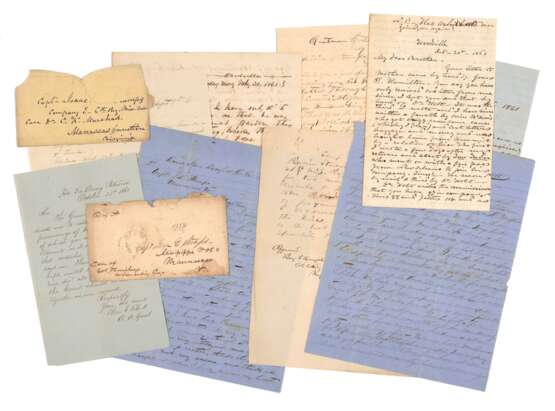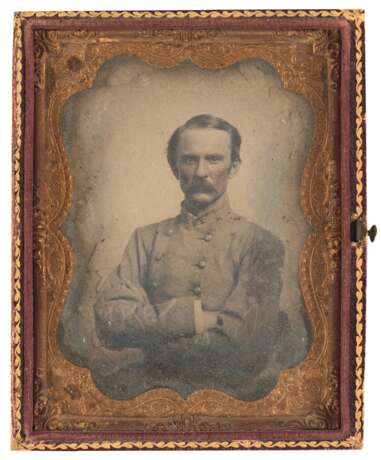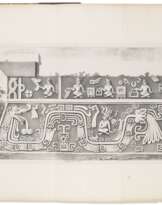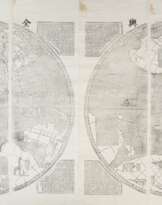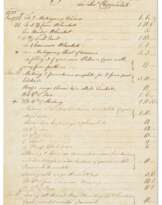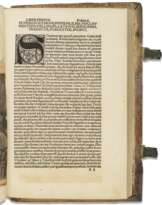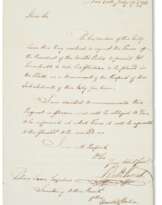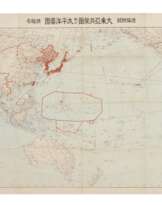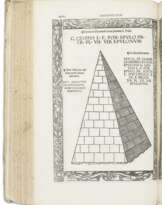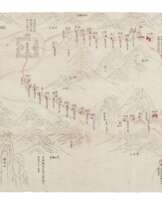ID 627690
Lot 199 | A Civil War correspondence by Jefferson Davis' nephew
Estimate value
$ 10 000 – 15 000
233 pages in total, various sizes and paper types (fold separations to one letter, some with light text, very good condition overall); quarter-plate tintype, housed in a wooden case with a brass mat (front cover of case and velvet lining detached).
The correspondence of Isaac Davis Stamps, a Confederate officer killed at Gettysburg, and nephew of Jefferson Davis. A sizable and detailed series of letters, primarily between Stamps and his wife Mary. Born at Rosemont, Woodville, Mississippi, the boyhood home of his uncle Jefferson Davis, Stamps studied law in New Orleans before settling again in Woodville. The early portion of the correspondence between Isaac and Mary document their courtship and marriage in 1854. Following the outbreak of the Civil War, Stamps began recruiting for the 1st Mississippi (Brandon's) Regiment which was reorganized in October 1861 as the 21st Mississippi Infantry commanded by his father-in-law Col. Benjamin Humphreys. With the 21st, Captain Stamps saw action during the Peninsular campaign, notably at Yorktown, the Seven Days, Battles & Malvern Hill. The regiment also saw action at Antietam (Sharpsburg) as well as Fredericksburg and Chancellorsville. Stamps descriptions of the actions are vivid and detailed, most especially his lengthy description of Antietam and its terrible aftermath.
The letters also chronicle the political mood in the seceding states. Early letters in the wartime correspondence reveal the chaotic months preceding First Bull Run in the summer of 1861, as in his letter of 17 April: “We have stirring news - old Abe’s ‘Proclamation’ calling out 75 thousand militia from the Northern States to maintain the Government – and announcing that we shall within 20 days lay down our arms and disperse – No news from Pensacola as yet — Kentucky & Tennessee have offered any quantity of men to us & Breckenridge & McGriffin[?] telegraphed Mr[?] Davis that 7 thousand men were ready to march at a moments warning — A Gentleman … reports that the news was rec’d yesterday evening from Virginia that she had passed an ordinance of Secession.” Early optimism was soon tempered, and by late summer 1862 as he marched toward Harper's Ferry, enthusiasm in the border states was waning. While Lee's army had been serenaded by a brass band playing "My Maryland" soon after they crossed the Potomac, Stamps noted that while they "occasionally met with ladies who waived their hands & handkerchiefs at us but a majority of the population have shown … apathy"
Being the nephew of the President of the Confederate States had its perks. Writing to his brother in January 1862, Stamps reported that he had "spent a very pleasant time in Richmond - Uncle Jeff was very kind & insisted on my taking dinner with him every day while there & whilst giving my company the sword bayonet for our Rifles, did not forget me, but made a present of a handsome filed glass to be used when we are thrown out as skirmishers. Everyone has admired it – very much…." The correspondence also discusses his relationship with his enslaved servant Marion, who upon reaching Virginia became very sick from the water, and when he "very coolly told me the water was doing him no good & when he got back to Richmond he was going home," Stamps arrogantly accused him of faking his illness. But Stamps was soon proved wrong. In a subsequent letter, Stamps apologizes "that I wrote so irrationally about Marion for the very next day the poor fellow was taken very ill with typhoid fever & four 14 days I despaired of his life. I had to sit up & keep watch over him to keep him from wandering off, he was out of his head & raved at times. By close watching & the services of a skilled physician I think God he has been saved, his health is seriously damaged & I will send him home the first opportunity."
The final letter from Stamps present was written on 7 May 1863 reporting on Stonewall Jackson’s loss of his arm at Chancellorsville (Jackson would succumb to his wounds on the 10th). Stamps marched with his men in the Gettysburg campaign and he was killed on the second day of the battle supporting Confederate artillery in the Peach Orchard.
Subsequent letters in the correspondence concern Mary Stamps efforts to have her husband's body brought back to Mississippi for burial. The correspondence includes several letters from H. Warren of Gettysburg in 1866 guiding her to where Stamps’ body lay “at the farm of John Crawford” near the battlefield.
[Also With:] [Newspaper]. The Weekly Mississippian. Jackson, 5 June 1861. Four pages, folio. (minor losses, uneven toning and foxing) – several pieces of supporting 20th century correspondence concerning genealogical and military records.
| Artist: | William Shakespeare (1564 - 1616) |
|---|---|
| Applied technique: | Pencil |
| Artist: | William Shakespeare (1564 - 1616) |
|---|---|
| Applied technique: | Pencil |
| Address of auction |
CHRISTIE'S 8 King Street, St. James's SW1Y 6QT London United Kingdom | |
|---|---|---|
| Preview |
| |
| Phone | +44 (0)20 7839 9060 | |
| Buyer Premium | see on Website | |
| Conditions of purchase | Conditions of purchase |
